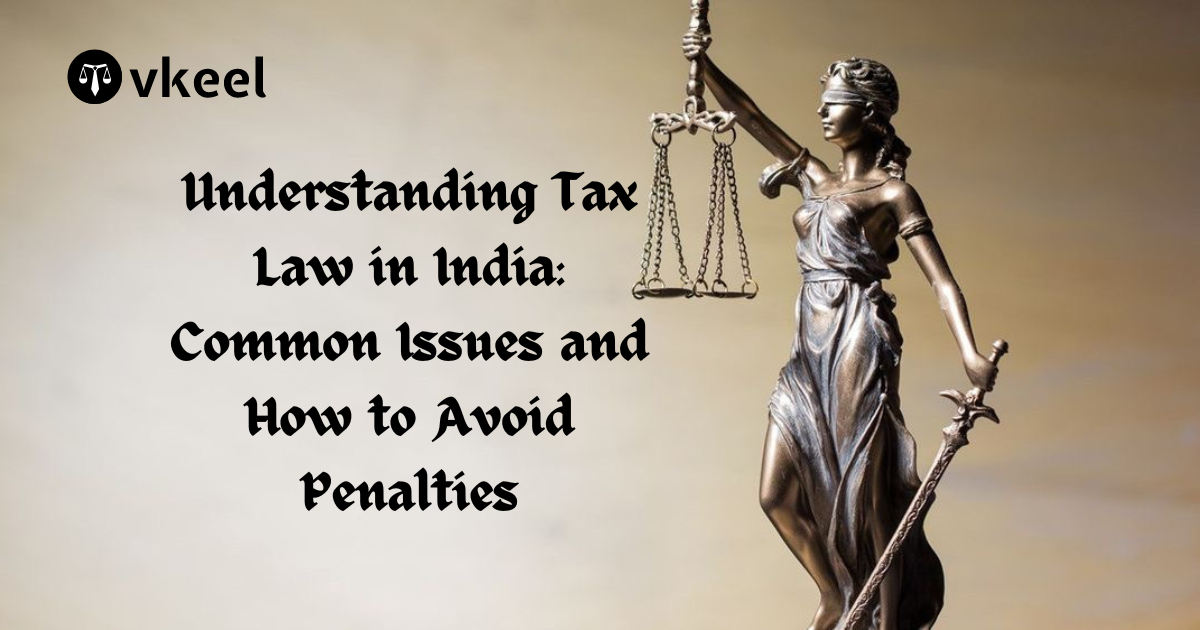Understanding Tax Law in India: Common Issues and How to Avoid Penalties
By Himanshu Kumar
Table of Contents
Introduction
Tax law in India is a comprehensive and complex system governed by multiple statutes, rules, and regulations. The primary laws include the Income Tax Act, 1961, the Goods and Services Tax (GST) Act, 2017, and various other allied laws. Understanding these laws is crucial for both individuals and businesses to ensure compliance and avoid penalties.
Tax laws in India serve multiple fundamental purposes. Primarily, they provide the government with a systematic and legal framework to collect revenue essential for the country’s functioning and development. This revenue funds infrastructure projects, public services, defense, education, healthcare, and social welfare programs, ensuring equitable distribution of wealth and resources. Without a robust tax system, the government would struggle to finance these essential services, leading to a lack of development and growth. Taxes also enable the government to implement economic policies aimed at stabilizing the economy, controlling inflation, and encouraging investments, thus fostering a conducive environment for economic progress.
Additionally, tax laws promote fairness and accountability in the financial system. By mandating the disclosure of income and wealth, they help in curbing black money, money laundering, and other financial malpractices. The structure of tax laws, which includes progressive taxation, ensures that individuals and entities contribute to the national exchequer based on their ability to pay, thus reducing economic inequality. Tax laws also incentivize specific economic activities through deductions and exemptions, encouraging savings, investments, and spending in particular sectors. Overall, tax laws are pivotal in maintaining a balanced and transparent economic system, fostering sustainable growth and social justice.
Common Issues in Indian Tax Law
1. Misreporting of Income
One of the most common issues in tax compliance is the misreporting of income. This can occur due to various reasons such as misunderstanding the tax provisions, errors in accounting, or intentional evasion.
Case Law: In the case of Commissioner of Income Tax vs. Reliance Petroproducts Pvt. Ltd. (2010), the Supreme Court held that mere making of a claim, which is not sustainable in law, by itself, will not amount to furnishing inaccurate particulars regarding the income of the assessee.
2. Non-filing or Late Filing of Returns
Filing of returns after the due date or not filing at all can attract penalties and interest. The Income Tax Act prescribes specific due dates for different categories of taxpayers.
Case Law: In Price Waterhouse Coopers Pvt. Ltd. vs. Commissioner of Income Tax (2012), the Supreme Court ruled that the penalty for non-filing of returns could be waived if the taxpayer demonstrates reasonable cause for the delay.
3. Errors in Claiming Deductions
Taxpayers often make errors in claiming deductions under various sections such as 80C, 80D, 80G, etc. Incorrect claims can lead to disallowance and penalties.
Case Law: The Delhi High Court in the case of Madhya Pradesh Transport Corporation vs. CIT (1986) emphasized that deductions should be claimed with due diligence and in accordance with the provisions of the law.
4. TDS (Tax Deducted at Source) Compliance
Non-compliance with TDS provisions can lead to severe penalties. This includes failure to deduct tax at source, late deduction, or late deposit of TDS.
Case Law: In Hindustan Coca Cola Beverage Pvt. Ltd. vs. CIT (2007), the Supreme Court held that the department cannot recover TDS from the deductor once the deductee has paid the tax.
How to Avoid Penalties
1. Accurate Reporting of Income
Ensure that all sources of income are accurately reported. This includes income from salaries, business, capital gains, house property, and other sources. Maintaining proper documentation and records can help in accurate reporting.
2. Timely Filing of Returns
Adhere to the deadlines for filing income tax returns. For individuals, the due date is usually July 31st of the assessment year. Businesses may have different deadlines. Filing returns on time can help avoid late fees and penalties.
3. Correct Claim of Deductions
Understand the provisions related to various deductions and exemptions. Consult with a tax advisor if needed to ensure that deductions are claimed correctly. Keep supporting documents for all deductions claimed.
4. TDS Compliance
Regularly review TDS obligations and ensure timely deduction and deposit of TDS. File TDS returns on time. Use TDS reconciliation statements to match TDS deductions with the amounts reflected in Form 26AS.
Recent Amendments in Tax Law
1. Faceless Assessment Scheme
The introduction of the Faceless Assessment Scheme aims to eliminate human interface in the income tax assessment proceedings. This scheme reduces the chances of corruption and ensures a transparent assessment process.
2. Changes in TDS/TCS Provisions
Recent amendments have introduced new TDS/TCS provisions. For instance, TDS on e-commerce transactions under Section 194-O and TCS on the sale of goods under Section 206C(1H). Keeping abreast of these changes is essential for compliance.
3. Introduction of New Tax Regimes
The government introduced a new tax regime under Section 115BAC for individuals and HUFs, offering lower tax rates without exemptions and deductions. Taxpayers now have the option to choose between the old and new regimes.
Penalties under Indian Tax Law
1. Penalty for Under-reporting and Misreporting of Income
Under Section 270A, a penalty of 50% of the tax payable on under-reported income and 200% on misreported income can be levied. Understanding the distinction between under-reporting and misreporting is crucial.
2. Penalty for Non-filing of Returns
Section 234F imposes a fee for late filing of income tax returns. The fee can be up to Rs. 10,000 depending on the delay and the total income.
3. Penalty for Failure to Deduct/Deposit TDS
Section 271C and Section 276B provide for penalties and prosecution for failure to deduct or deposit TDS. The penalty can be equivalent to the amount of TDS not deducted or not deposited.
4. Penalty for Incorrect Information
Section 271(1)(c) deals with penalties for concealment of income or furnishing inaccurate particulars. The penalty can range from 100% to 300% of the tax sought to be evaded.
Case Studies
1. Vodafone International Holdings BV vs. Union of India (2012)
This landmark case dealt with the issue of tax on indirect transfer of shares. The Supreme Court ruled in favor of Vodafone, holding that the transaction was not taxable in India. The case led to the introduction of retrospective amendments in the Income Tax Act, 1961.
2. CIT vs. P. Mohanakala (2007)
In this case, the Supreme Court dealt with the issue of unexplained cash credits. The court held that the burden of proof is on the taxpayer to explain the nature and source of the credits. Failure to do so can lead to addition of the amount to the income and levy of penalties.
Conclusion
Understanding tax law in India requires continuous learning and staying updated with the latest amendments and judicial pronouncements. Common issues such as misreporting of income, non-filing of returns, errors in claiming deductions, and TDS compliance can be mitigated through diligent practices and consultation with tax professionals. Recent amendments and landmark case laws provide valuable insights into the evolving landscape of tax law in India. By ensuring accurate reporting, timely compliance, and understanding the implications of various provisions, taxpayers can avoid penalties and contribute to a transparent tax regime.
References
- Income Tax Act, 1961
- Goods and Services Tax Act, 2017
- Faceless Assessment Scheme, 2020
- Case Laws: Supreme Court of India
Disclaimer:
The information provided in the article is for general informational purposes only, and is not intended to constitute legal advice or to be relied upon as a substitute for legal advice. Furthermore, any information contained in the article is not guaranteed to be current, complete or accurate. If you require legal advice or representation, you should contact an attorney or law firm directly. We are not responsible for any damages resulting from any reliance on the content of this website.










